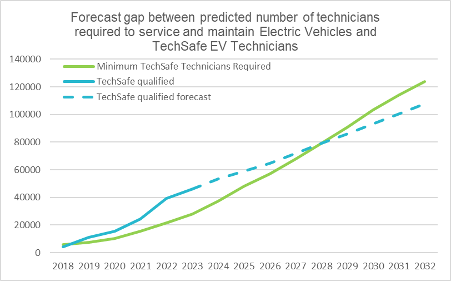The number of automotive technicians undertaking training in electric vehicle repair increased last year, as the industry fights to avoid a shortfall in skills by 2032.
Figures released by the Institute of the Motor Industry (IMI) show that over 14,800 technicians undertook the training and qualifications required to obtain IMI TechSafe professional recognition last year. This boosted the total number of qualified technicians able to safely conduct electric vehicle repair work in the UK to 39,000 by the end of 2022.
However, while the effort shown by employers and individuals to upskill as the automotive industry moves towards zero-emission vehicles should be commended, the IMI is calling for an acceleration in electric vehicle repair training to avoid a potential shortfall of 16,000 qualified technicians currently predicted by 2032.
Electric vehicle repair just as complex as ICE
In particular the IMI is highlighting that previous market expectations of electric vehicles requiring less time for servicing may be misplaced, increasing pressure on a workforce already dealing with an ageing UK car parc.
“Despite a long-held belief that EVs, with less moving parts, will be quicker to service than their ICE counterparts, in-depth analysis conducted by the IMI for our response to the MOT Consultation suggests otherwise”, explained Steve Nash, CEO of the Institute of the Motor Industry.
“In particular tyre wear on electric vehicles is heavier than on ICE models; according to Garage Industry Trends analysis of 2021 MOT test data, EVs had a failure rate of 11.43% for 2018 registered vehicles compared to 10.45% for petrol vehicles and the weak point was identified as tyres.
“The assumption that more EVs can be serviced by a single technician compared to non-EVs therefore no longer rings true. Garages and workshops cannot simply assume they will need fewer technicians for electric vehicle repair and service options. Add to this the fact that the UK car parc is ageing rapidly, increasing the need for maintenance, and adding to the already sizeable workload of technicians, and it is easy to see how the training and deployment of technicians qualified to work on EVs needs to shift up a gear.”
Shortfall in skills unless pace quickens
The IMI’s latest analysis predicts that by 2030, 103,000 IMI TechSafe qualified technicians will be needed to complete electric vehicle repair work, increasing to 124,000 by 2032. However, the adjusted forecast warns of a potential shortfall of 4,500 qualified technicians by 2029, increasing to a massive skills gap of 16,000 by 2032.

While Auto Trader Insights data previously outlined a decline in demand for electric vehicles due to the cost-of-living crisis, the Society of Motor Manufacturers and Traders (SMMT) reports an 18.8% increase in new registrations of battery electric vehicles (BEV) in the first three months of 2023 compared to the previous year.
The SMMT figures might not signify an end to overall dampened demand for EVs, yet they do demonstrate presence of a continued appetite for the new drivetrain from UK motorists before the ban of the sale of new ICE vehicles in 2030.
“Whether it is the carrot of lower fuel costs, the stick of the 2030 ban, or simply the fact that the environmental message is hitting home to motorists, it seems the desire for EV remains”, concluded Nash. “We cannot afford to dampen this by eroding customer confidence in the ability of garages to conduct electric vehicle repair, service plans and maintenance.
“Despite good take-up of qualifications in 2022, economic pressures are putting a squeeze on training budgets for new EV technicians and for those who are already IMI TechSafe qualified yet need continuous professional development (CPD) to keep up with technological advancements. Coupled with the high employment churn, this is putting more pressure on the sector. If the Government does not step up soon with training support, EV trained technicians will not be available and so it risks scoring an embarrassing own-goal on its decarbonisation target.”




You must be logged in to post a comment.